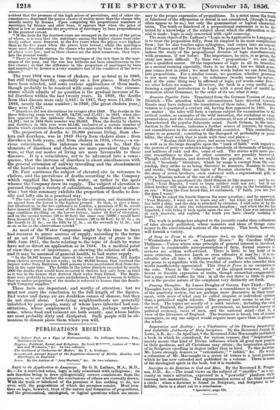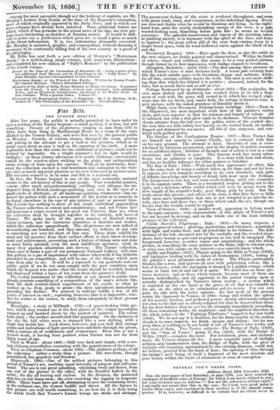PUBLICATIONS RECEIVED.
Booxs.
Sir Robert Peel, as a Type of Statesmanship. By Dellinger Symons, Esq., Barrister-at-law.
Naples; Political, Social, and Religious. By Lord B , Author of " Mas- ten and Workmen," &c. In two volumes.
The Girlhood of Catherine de' Medici. By T. A. Trollope.
Seventeenth Annual Report of the Registrar-General of Births, Deaths, and Marriages, in _England.
Isom By the.Author of "Amy Herbert," ire. In two volumes.
Logic in its Application to Language. By G. It. Latham, M.A., M.D., &c.—In a restricted sense, logic is only concerned with syllogisms ; its sole function being to draw syllogistically correct conclusions from the premises, or to see whether the conclusions of others are correctly drawn. With the truth or falsehood of the premises it has nothing to do, nor even with the propositions of which the premises consist. Most trea- tises on logic, however, treat of the nature and formation of propositions, and the granimaticalt ontological, or logical questions which are neces- sary to the proper expression of propositions. In a strict sense the truth or falsehood of the affirmation or denial is not considered, (though it may often appear to be so,) but only the grammatical or logical character- istics. The truth or falsehood of a propositional statement is to be de- tected by a knowledge of the subject about which the affirmation or de. ilia is made : logic is only concerned with right reasoning.
The main object of Dr. Latham's "Logic in its Application to Language" is to treat the proposition fully, from its simplest to its most complicated form ; but he also touches upon syllogisms, and enters into an expose tion of Names and the Parts of Speech. The purpose he has in view is to induce the study of the propositional division of logic simultaneously with grammar, if not before. The,importance, he says, is as great, the study not more difficult. To these two " propositions " we can only give a qualified assent. Of the importance of logic in all its branches, as a mental training especially, there is no doubt but we think gram_ mar comes first in order ; we must have words before we can form them into propositions. For a similar reason, we question whether grammar is not more easy than logic : its substance (words) comes by nature ; and if the same thing may be affirmed of logic, yet words come firsts_ we utter before we reason. However, the book is a very useful one forming a capital introduction to Logic with a good deal of useful in. formation about Grammar, be the order of its use what it may.
Russian Popular Tales. Translated from the German Version of Anton Dietrich.—The attention which circumstances have directed towards Russia may have induced the translation of these tales - for the German version is a quarter of a century old, having first appeared in 1831. But no matter : the tales will form a curious subject for examination to the critical reader, as examples of the wild invention, the credulous or exag- gerated ideas, and the total absence of sentiment, if not of morality, which characterized the popular Sclavonic mind. Jacob Grimm, in his intro- duction to the volume, indicates a further source of interest, by tracing out resemblances in the stories of different countries. This resemblance seems to us general ; consisting in the disregard of probability or possi- bility, the short work that is made with time and place-
" Realms shift their place, and ocean turns to land" —
afi well as in the hirge draughts upon the "bank of faith" with regard to the powers of petty or unknown kings—hundreds of thousands of knights, and millions of rank and file, come at call. The stories with more pre- cise resemblance to those of other countries are possibly borrowed. Though called Russian, and derived from the popular, or, as we might call it, " broadside " literature, which by usage is exempt from the cen- sorship, they strike us as being Slavonic in manners, Russian in terms and words ; though there are traits of Russian character. This from the story of seven brothers, each endowed with a supernatural gift, is quite a Russian notion of the use of a ship- " Thereupon hfsqueationed the third Simeon in like manner ; and he re- plied, Your Majesty, I want to learn neither craft nor art; but if my eldest brother will make me an axe I will build a ship in the twinkling of
an eye.' When the Czar heard this, he exclaimed, faith, you are just the men I want ! '
" Then he asked the fourth Simeon the same question ; and he answered, Your Majesty, I want not to learn any art ; but when my third brother has built a ship, and the ship is attacked by enemies, I will seize it by the prow, and draw it into the subterranean kingdom; and when the foe has departed, I will bring it back again upon the sea.' The Czar was astounded at such marvels, and replied, In truth you have clearly nothing to learn ! "
The work is perhaps less adapted to the juvenile reader than collections of tales already published, whose manners and ideas of things come nearer to the conventional notions of the nursery. This book, however, will furnish a variety.
A Song in Prose to the Westminster Owl, on the Criticism of the "Westminster Review" on "Lonely Hours." By Caroline Giffard Philipson.—Unless where some principle of general interest is involved, or there is considerable misrepresentation of facts, formal answers to reviews are seldom well-advised. There is little to lay hold of in mere criticism, however harsh or even offensive it may be; it is re- solvable after all into a difference of opinion. The world, besides is not prone to sympathize with the troubles of authors who consider their works insufficiently appreciated. This Song in Prose is no exception to the rale. There is the " character " of the alleged reviewer, not de- ficient in forcible expression of traits, though somewhat exaggerated; but a page would suffice for this : in all the rest there is little to grasp, nor is the precise nature of the complaint very distinctly set forth.
Passing Thoughts. By James Douglas of Cavers. Part Third.—These Thoughts have, like the previous papers, a resemblance to the " article " of the quarterly review, but are perhaps more discursive in their treat- ment, with more of what may be called singular or individual opinion than a periodical might tolerate. The present part seems to us one of the best. The topics are mostly of a solid interest ; including the civil wars of England, the principles of government, an historical survey of political economy, races of men, and the national mind—that is, a view of the literature of England. The treatment is broad, but of comae incomplete, as any one subject would require more space than is given to the whole.
Inspiration and Reality : or a Vindication of the Plenary Inspiration and Infallible Authority of Holy Scripture. By the Reverend Josiah B. Lowe, A.B., &c.—In April last, • the Reverend John Macnaught published a book in which he considered, for various reasons, that inspiration " merely meant that kind of Divine influence which all good men possess in their goodness, and all Christians may attain; the inspiration spoken of in Scripture excelling in degree rather than in End. To this doctrine Mr. Lowe strongly demurs as "rationalistic," " infidel," Ste. He wrote a refutation of Mr. Macnaught in a series of letters to a local journal, which he has now extended and published in a volume. There is some of the theological spirit in the book, but it is readable.
Sacrffice in its Relation to God and Han. By the Reverend R. Fergu- son, D.D., &c.—The usual views on the subject of " sacrifice" as a ne- cessity in man's salvation, expressed in a "powerful" platform style running into mannerism. The argumentation seems of the kind termed a circle : when a doctrine is found in Scripture, and Scripture is in- fallible, there is a short cut to a conclusion.
• Spectator, page 451.
Among the most agreeable though not the bulkiest of reprints, are Mr. Murphy's Letters from Russia at the time of the Emperor's coronation, most of which originally appeared in the Daily News and to which our news columns have already been indebted. Some additional letters are added, which if less germane to the actual news of the day, are now per- haps more interesting as sketches of Russian society. It would be diffi- cult to point out a publication which gives for so small a price so much of the latest information. It is, too, information pleasantly conveyed. Mr. Murphy is animated, graphic, and cosmopolitan, without deeming it necessary to be continually falling foul of his own country as a proof of his philosophy. Mr. Bohn has sent forth a new edition of Marryat's " Masterman. Beady," in a well-looking single volume, with numerous illustrations : and completed his new edition of " Sullyls Memoirs" by the publication of the fourth volume.
,Russia at the Time of the Coronation of Alexander II.: being a series of let- ters addressed from Moscow and St. Petersburg to the " Daily News." By John Murphy, Special Correspondent of that Journal.
Masterrnan Ready; or the Wreck of the Pacific. Written for Young People. By Captain Marryat. (Bohn's Illustrated Library.) Memoirs of the Duke of Sully, Prime Minister to Henry the Great. Translated from the French. A new edition, revised and corrected ; with additional Notes, and an Historical Introduction, attributed to Sir Walter Scott. In four volumes. With a general Index. Volume IV.
Elements of the Economy:of Nature : a Fragment. By J. G. Macivar, D.D.,
Author of " The Philosophy of the Beautiful," &c. Second edition.1



























 Previous page
Previous page